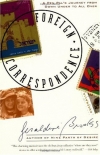Foreign Correspondence: A Pen Pal's Journey by Geraldine Brooks (finding audrey .TXT) 📗

- Author: Geraldine Brooks
Book online «Foreign Correspondence: A Pen Pal's Journey by Geraldine Brooks (finding audrey .TXT) 📗». Author Geraldine Brooks
But what was my side? My colleague was talking of physical placement, but his words hummed with the internal dilemma I’d faced ever since my arrival. I’d become a Jew out of sentimental identification with the world’s eternal underdogs, but the place in which I had arrived wasn’t my father’s tiny, defenseless little Israel, encircled by enemies. It was a tough state, using an army to put down civilian unrest. I had become a Jew because I wanted to be on my husband’s side in the world. But in the streets of the occupied territories in the winter of 1987 that side was no longer an unambiguous place to be.
As I reported the course of the intifada, I found myself making friends with both Arabs and Jews. But the relationships were always strained. The Palestinians demonized Israelis, the Israelis dehumanized Palestinians. On each side it was rare to find a shred of empathy for the other.
On the phone to Australia, conversations with my father were equally tiring. The enthusiasm he’d shared with me, that had given us some common ground, was now a place of prickly disagreement. His Zionism had hardened over the years into a faith that brooked none of the ambiguity that troubled me. He was as ardent as any West Bank settler, and kept up a steady stream of letters to the Sydney newspapers espousing the rightness of a tough Israeli response to the Palestinians.
I had been covering the intifada for a year when Arafat decided to make a symbolic Declaration of Independence for the occupied territories, to boost the young stone throwers’ flagging morale. On the day of the announcement, the Israeli army deployed, to leave Palestinians in no doubt as to who controlled their “independent” land. The army declared the entire West Bank a closed military area. But soldiers couldn’t block every shepherd’s path, so early in the morning I crammed into the back of a rattling old Fiat with a group of Palestinian students. We bumped over a rocky trail through olive groves to the Arab town of Ramallah, joining a steady trickle of illicit traffic as we reached the edge of the city.
In Ramallah, soldiers were everywhere, ordering anyone on the street to go to their houses. They were on us within minutes, eighteen-year-olds much the same age as the Palestinian students, poking the muzzles of their assault rifles in our faces and yelling in Hebrew for our IDs. I pulled out my Australian passport and handed it over. The Israeli youths stared at it and then called for their officer.
He was in his thirties. From his slight paunch, it was obvious he was a reservist, called up for his compulsory month of annual duty. The fatigue of bad nights on unfamiliar army cots was etched into his face. He paged through the passport, eying the array of Arab visas. He raised his head and looked at me wearily. “I think you’re a journalist, and I think you shouldn’t be here.” I didn’t want to lie, but I didn’t want to be escorted back to Jerusalem, either. “I’m just here with my friends,” I said. “Just visiting.”
We gazed at each other and recognized a kind of kinship. Both of us were in this tense West Bank town because of our jobs, jobs that demanded we do things that made us uncomfortable. “Get off the street,” he said. “If I see you again I’ll arrest you.”
As I melted away with the students, I found myself thinking of my old pen pal Cohen. The reservist with the tousled hair and the softening midriff could be him, doing his annual military service. I tried to conjure a picture of Cohen from his letters to me so long ago. I wanted to find him, to turn up at his door and say, “See? Here I am. I told you I would come.” Maybe military service had already claimed him, in the Yom Kippur War or in Lebanon. I wanted to find Mishal, too, and try out my newly acquired Arabic on him. But I hadn’t written to either of them since the early 1970s.
And I had no time. With the Iran-Iraq War edging into an eighth year, Islamic fundamentalism on the rise, Lebanon in flames, price riots in Jordan and famine in the Horn of Africa, I was on the Frequent Flyer program from hell. More than a year into my new assignment, I hadn’t taken a single day off. I could hardly spare the time to search for my old pen pals, even if I had a place to start.
I couldn’t remember their old addresses. I supposed that their letters were lost, tossed out with school exercise books and birthday cards in some long-ago cleanup. It was five years before I found them in my father’s neglected tea chests. And it was another two years before I set out to discover what had become of the teenagers who once lived in those faraway places.
• • •
“What is the purpose of your visit to Israel? Do you know anyone there? How do you know them? What are their names?”
The rapid-fire interrogations droned on. As I waited in line to be questioned by the El Al airlines security staff, I pulled the fragile old envelopes from my bag and studied the addresses. In a corner of my ticket envelope I clumsily doodled a fiery-looking Hebrew alef, trying to picture what Amme Street would look like on a Hebrew-lettered street sign. I practiced asking, wayn issharia hatha? (Where is this street?) in my rusty Arabic.
The people on line for the flight covered the spectrum of American Jewry. There were stylish Orthodox women from the Upper East Side, fulfilling the modest dress code





Comments (0)